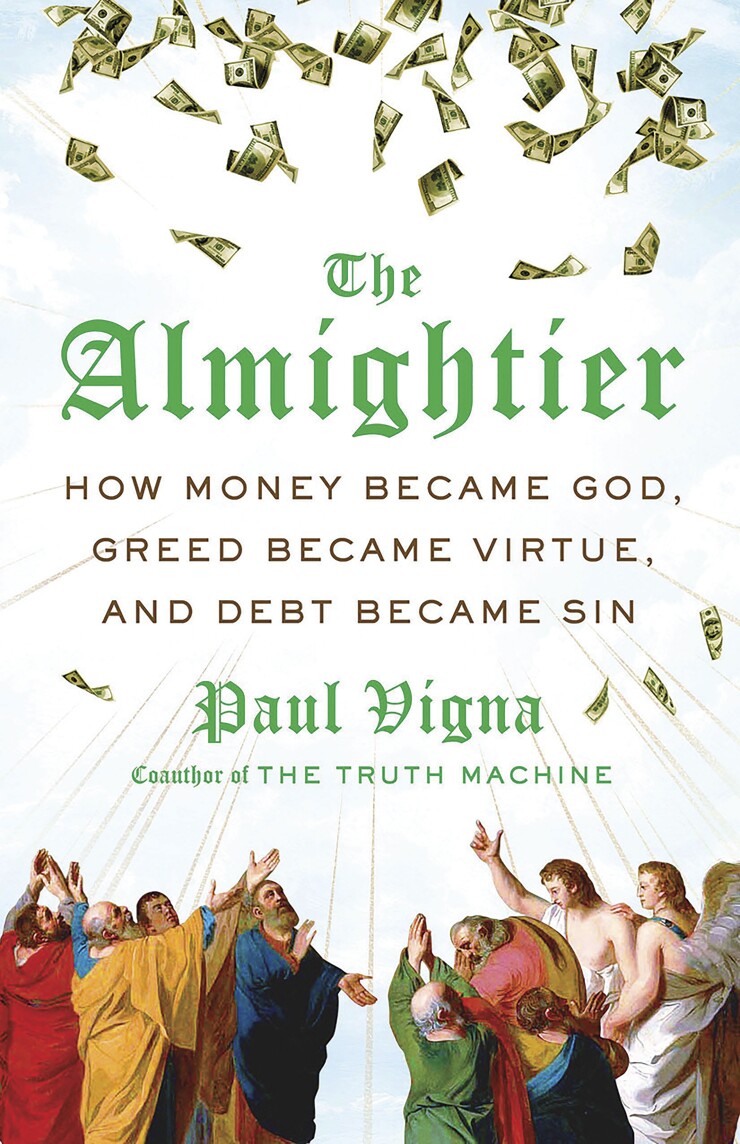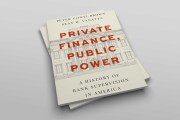The Almightier: How Money Became God, Greed Became Virtue, and Debt Became Sin. By Paul Vigna. St. Martin's Press, 2025.

Paul Vigna's "The Almightier" is an idiosyncratic, unorthodox but compulsively readable interpretation of money, greed and debt.
Vigna is a veteran business journalist and author who has written extensively about cryptocurrency. In "The Almightier," he aims to reclaim money's forgotten history and complex relationship with religion. A central tenet of the book is that money, which got its start as a rudimentary accounting system in a Mesopotamian temple, has come to displace religion and God as society's bedrock. "We swapped worship of a deity with the pursuit of wealth as the central thing around which our society revolves," Vigna writes.
This is a critical problem since "money isn't good at being a religion. It wasn't built to be one and it doesn't have any of the redeeming qualities of one," Vigna adds. Now, money has become perhaps the central barrier to giving everyone enough of what they need. "We are and have been at the point where we can make sure every person, everywhere, really does have the security of life, liberty and the pursuit of happiness," Vigna argues.
"The Almightier" isn't a primer on reordering society, but rather an explanation of how things came to be. Vigna hopes understanding money's backstory can serve as a starting point for change.
Vigna begins his story in ancient Mesopotamia, writing about a temple official who kept detailed accounts on clay tablets, the first recorded instance of money. Mesopotamians and other civilizations placed the business of debt and credit "in the realm of deities," Vigna writes.
More central perhaps to the book's theme is Vigna's description of the evolution of debt forgiveness, which he notes evolved centuries before Jesus as a tool for triumphant monarchs to revive the regions they conquered. According to Vigna, Nehemiah urged a kind of debt forgiveness to spur the rebuilding of Jerusalem following the Persian exile.
But Vigna's most fascinating example of debt forgiveness, or jubilee, came hundreds of years after Nehemiah. In Vigna's telling, the concept of jubilee, which had been largely forgotten, was central to the message of Jesus, known as Yeshua in the book. It was particularly resonant since the Roman Empire was in the throes of a financial panic that hit debtors hard.
With this crisis at a fever pitch, Yeshua entered Jerusalem, threw the moneylenders out of the Temple and was ultimately executed by Roman authorities. Vigna sees this story in a radically different light from Christian teaching; he paints the forgiveness Yeshua preached as debt forgiveness: "This, [Yeshua] argues, is God's law. To treat each other as you would a brother or sister, or yourself. To forgive debts that are so onerous they destroy lives."
Yeshua, according to Vigna, was likely triggered by the lending he witnessed: "This was where the edicts about the [jubilee] should be coming from. Instead, they were making loans! Charging interest, taking advantage of the poor, and perpetuating the imbalance that made life so hard on the very people the temple was supposed to be helping." Vigna paints an analogy to Occupy Wall Street. To restore the status quo, the Jewish authorities turned to the Romans, who were already skittish about debt relief.
In Vigna's critique, Jesus emerges as a political figure with a revolutionary message. "I think Yeshua really thought the patterns of people's attitudes towards money could be changed," Vigna writes. "He stood opposed to that signal and believed it went against what he saw to be God's law. He tried to change the tide of history. … He was willing to give his life for it. And in 33 CE, he did."
If Yeshua's entry into Jerusalem and confrontation in the Temple marked the climax of his ministry, it also marked the high point for jubilee and debt forgiveness in Vigna's book. Indeed, he titled the chapter "The Last Jubilee." The remainder of "The Almightier" chronicles the rise of finance and greed to the heights they currently command.
Vigna briskly surveys the millennium following Yeshua's death. The Catholic Church's rise is notable for its officially hostile attitude toward commerce and lending, as well as its strict admonition against usury. But behind the facade, clergymen were scrambling to accumulate wealth and power. "The church may have railed against greed," Vigna writes, "but it had burrowed its way into the minds of priests, bishops, cardinals, and popes."
(As it happens, 2025 is a jubilee year for the Catholic Church, with pilgrimages and prayers, but without a debt-cancellation aspect. The late Pope Francis did call for debt forgiveness for poor countries to coincide with the celebrations, but that hasn't been widely implemented. It remains to be seen what the new Pope Leo will say.)
This dark age was punctuated by the Black Death, the bubonic plague that afflicted Europe, killing tens of millions of people.
This trauma moved some to embrace a chivalrous fantasy, but others refocused on antiquity, "fanning out across the continent in search of old manuscripts, learning to write in the ancient languages and trying to revive the lost splendor of the Empire," Vigna writes.
"The Almightier" highlights Poggio Bracciolini, a papal secretary, humanist and bibliophile noted for recovering numerous Latin manuscripts. Vigna focuses on one of his works, a dialogue entitled "De Avarita," or "On Greed," which modern scholars view as a precursor to capitalism.
Bracciolini attacked the church for its hypocrisy, but he also attacked strictures surrounding greed, arguing that people pursuing their self-interest actually made the world a better place. His arguments did more than reflect "the prevailing ethos of at least Florence and probably some of the other mercantile-driven republics of Italy"; they provided the economic justification for capitalism.
Vigna concludes by shifting into the realm of policy. He discusses caps on interest rates and strategies to make financial services more accessible, but his "big idea" is a modern-day jubilee. It would be achieved not by canceling debt, but by injecting enough money into the economy to pay off all existent debts, national, corporate and individual. Vigna estimated the tab at $300 trillion. Such a proposal involves risks, not the least of them inflation, but it also offers a way "to zero out the global balance sheet and start over," Vigna argues. "Trillions of dollars used on debt payments would suddenly become free cash flow. Whatever you pay out a month in mortgages or credit card bills or auto loans or student loans, imagine that all becomes cash in your pocket. There'd be a huge wealth effect."
And, according to Vigna, there are modern precedents. The victorious Allies canceled the debts of Germany and Japan after World War II. More recently the Federal Reserve lowered interest rates to nearly zero, and the government flirted with canceling some student loans.
Vigna doesn't really go into the mechanics of how to accomplish his plan. Some readers may well conclude his call to "reset the ledger" is too fanciful to become reality. That doesn't mean it isn't worth considering.






